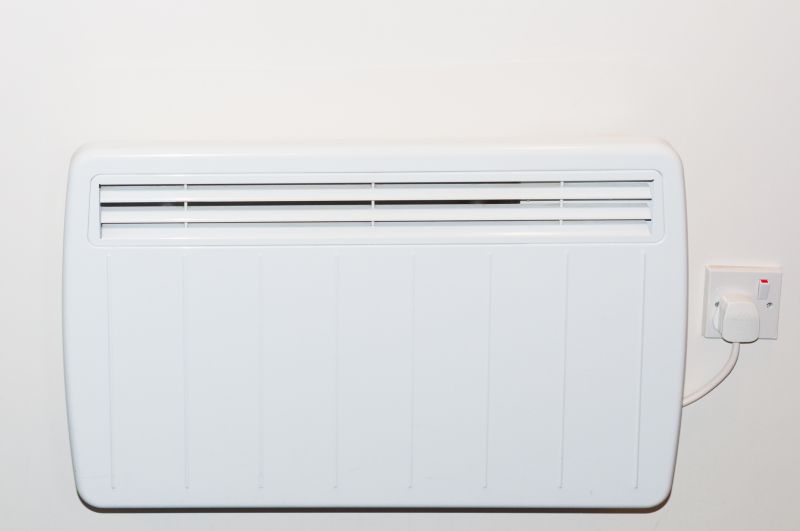Popular Wall Heater Installation Products For Gas And Electric Systems
Discover essential products that ensure reliable performance and simple setup for gas and electric wall heater installations.
 Installing gas and electric wall heaters can be an effective way to add supplemental heat to specific areas within a home or commercial space. These units are designed to be mounted directly onto walls, saving floor space and providing targeted warmth. When selecting products for wall heater installation, it is important to consider factors such as safety features, power source compatibility, and ease of installation. Many models come with adjustable thermostats, safety shut-off mechanisms, and user-friendly controls to enhance convenience and safety.
Installing gas and electric wall heaters can be an effective way to add supplemental heat to specific areas within a home or commercial space. These units are designed to be mounted directly onto walls, saving floor space and providing targeted warmth. When selecting products for wall heater installation, it is important to consider factors such as safety features, power source compatibility, and ease of installation. Many models come with adjustable thermostats, safety shut-off mechanisms, and user-friendly controls to enhance convenience and safety.
Top Overall Option
Electric Wall Heater with Adjustable Thermostat and Safety Features
This versatile electric wall heater offers adjustable temperature controls and built-in safety shut-off mechanisms, making it suitable for a variety of indoor spaces. Its compact design allows for easy installation on most walls, and its user-friendly interface provides convenient operation. Ideal for supplemental heating, it combines safety and functionality in a sleek package.
Types of Products For Gas And Electric Wall Heater Installations
Electric Wall Heaters
Electric wall heaters are popular for their ease of installation and low maintenance requirements. They often feature adjustable thermostats and safety shut-off switches.
Gas Wall Heaters
Gas wall heaters provide a reliable heat source and typically require venting and professional installation to ensure safety.
Infrared Wall Heaters
Infrared models emit radiant heat directly to objects and people, providing quick warmth in targeted areas.
Convection Wall Heaters
These heaters warm the air through convection currents, offering consistent heat distribution across a room.
Vented Gas Wall Heaters
Designed for proper venting, these units are suitable for larger spaces and colder climates.
Unvented Gas Wall Heaters
These models do not require venting but must be used with caution and proper safety measures.
Electric Panel Heaters
Slim and unobtrusive, these heaters are ideal for modern interiors and can be mounted flush against walls.
Direct Vent Gas Heaters
Offering efficient heating with venting to the outside, suitable for well-insulated spaces.
Ceramic Wall Heaters
Utilize ceramic heating elements for rapid and efficient heat output, often with adjustable settings.
Portable Wall-Mounted Units
Designed for flexible placement, these units can be moved as needed and are often electric.
Hybrid Wall Heaters
Combine electric and gas heating options for versatile use in different environments.
Decorative Wall Heaters
Feature aesthetic designs that blend seamlessly with interior decor while providing functional heat.
Popular Choices
These sleek, wall-mounted panels are favored for their modern look and efficient electric operation.
Commonly chosen for their reliable heat output and suitability for larger spaces.
Popular for quick and direct heating, especially in spaces where instant warmth is desired.
Trusted for consistent room heating and quiet operation.
Chosen for their rapid heating capabilities and energy efficiency.
Provide quick heat with a fan-assisted mechanism, suitable for immediate warmth.
Selected for spaces where venting is impractical, with safety considerations in mind.
Add aesthetic appeal while serving as functional heating units.
Offer flexibility and easy installation for temporary or changing needs.
Provide versatile heating options for different preferences and requirements.
Popular for their efficiency and safety features in well-insulated spaces.
Wall heaters are available in a variety of configurations, including electric models that are often easier to install and maintain, as well as gas-powered units that may require proper venting and professional installation. Proper placement and installation are crucial for optimal performance and safety. For electric units, ensuring the electrical wiring meets local codes is essential, while gas units must be connected to a reliable gas supply and vented correctly to prevent the buildup of harmful gases.
The choice of a wall heater also depends on the size of the space to be heated. Smaller rooms may only require compact units, whereas larger areas might benefit from higher-capacity models with multiple heat settings. Additionally, some units offer features such as remote controls, programmable timers, and decorative designs that can complement interior aesthetics. Regular maintenance, such as cleaning filters or inspecting venting systems, can help prolong the lifespan and ensure safe operation.
Overall, selecting the right product for gas and electric wall heater installation involves balancing safety, efficiency, and convenience. Consulting product specifications and installation guidelines can help ensure that the chosen unit fits the specific needs of the space and complies with local safety standards.
Key Buying Considerations
- Space size and heating capacity needed for the room
- Type of power source available and compatibility
- Safety features such as automatic shut-off and tip-over protection
- Installation requirements including venting and electrical wiring
- Ease of operation, including remote controls and thermostats
- Design and aesthetic compatibility with interior decor
- Energy efficiency and operating costs
- Maintenance needs and accessibility for cleaning
- Noise levels during operation
- Compliance with local safety and building codes
- Availability of replacement parts and customer support
- Additional features like timers, programmable settings, or decorative elements
- Venting requirements for gas models to ensure safety
- Weight and mounting options for secure installation
- Environmental considerations, if applicable
